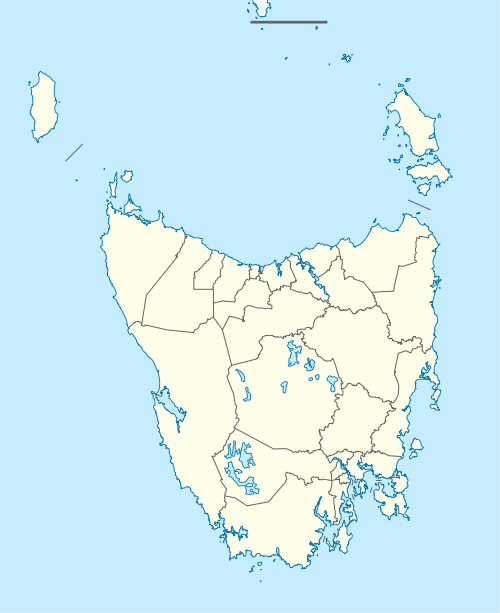Plenty, Tasmania
Plenty is a small locality and the name of a tributary river on the south side of the River Derwent in the Derwent Valley in Tasmania. It is on the main road between New Norfolk and Bushy Park. At the 2006 census, Plenty had a population of 164.[1]
| Plenty Tasmania | |
|---|---|
 Plenty | |
| Coordinates | 42°44′26″S 146°57′09″E |
| Postcode(s) | 7140 |
| LGA(s) | Derwent Valley Council |
| State electorate(s) | Lyons |
| Federal Division(s) | Lyons |
Formerly the location of hop growing, and fishing for salmon trout (brown trout), it is now notable for the Salmon Ponds (the original 1864 Plenty river fish hatchery) and the Tasmanian Museum of Trout Fishing.[2]
History
River Plenty Post Office opened on 27 March 1869, was renamed Plenty in 1895 and closed in 1956.[3] The town is notable as it was the location of the first introductions of brown trout outside their native range when in 1864, 300 of 1500 brown trout eggs from the River Itchen survived a four-month voyage from Falmouth, Cornwall to Melbourne on the sailing ship Norfolk. By 1866, 171 young brown trout were surviving in a Plenty river hatchery. Thirty-eight young trout were released in the river in 1866. By 1868, the Plenty River hosted a self-sustaining population of brown trout which became a brood source for continued introduction of brown trout into Australian and New Zealand rivers.[4]
Atlantic salmon, although successfully reared in the Plenty river hatchery and introduced at the same time under the sponsorship of the Acclimatization Society of Victoria, failed to establish themselves in Tasmania or Australia.[5]
Notes and references
- Australian Bureau of Statistics (25 October 2007). "Plenty (State Suburb)". 2006 Census QuickStats. Retrieved 22 November 2011.
- "Salmon Ponds: Plenty River, Plenty Fun!". think-tasmania.com. Retrieved 21 February 2014.
- Premier Postal History. "Post Office List". Premier Postal Auctions. Retrieved 16 June 2012.
- Heacox, Cecil E. (1974). "Back Cast". The Complete Brown Trout. New York: Winchester Press. pp. 7–23. ISBN 0-87691-129-7.
- Newton, Chris (2013). "The Strange Case of the Disappearing Salmon". The Trout's Tale - The Fish That Conquered an Empire. Ellesmere, Shropshire: Medlar Press. pp. 57–66. ISBN 978-1-907110-44-3.
- Dimmick, Leonard W. (2004) Fishes and men: the Jones family of Plenty, Tasmania Glenorchy, Tas. L.W. Dimmick. ISBN 0-9578153-2-8